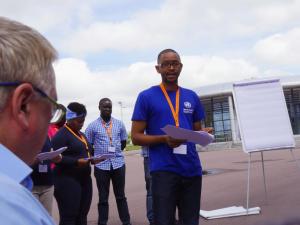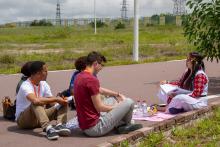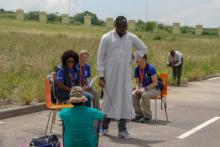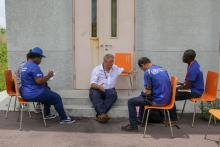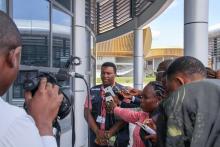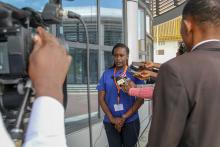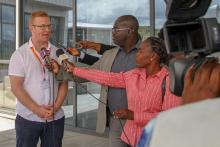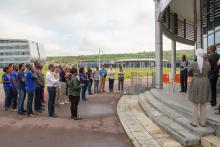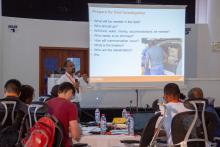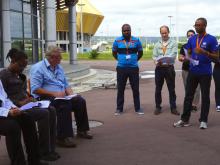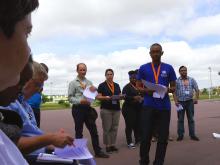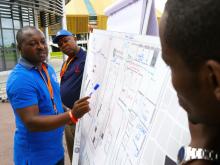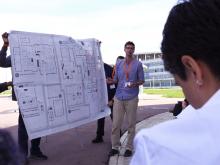Getting ready for Africa’s next major health emergency
It was August 2014 and Lieutenant (Dr) Boie Jalloh was in the second week of his medical internship at the 34th Military Hospital in Freetown, Sierra Leone. The capital city had just recorded its first cases of Ebola and despite his inexperience, the 30-year old doctor was instructed to work in the hospital’s makeshift Ebola treatment unit.
“I faced the predicament of following my family’s wish to leave the country and not work in the Ebola unit, and the state’s wish that I join the fight against the disease,” said Dr Jalloh. “I ended up carefully explaining to my family the significance of the Hippocratic Oath”.
Dr Jalloh had only received one lecture on Ebola while in medical school.
”More lives could have been saved if my colleagues or I had had prior training on outbreak response, said Dr Jalloh.”We could have prevented or better managed the many cases that quickly overwhelmed the make-shift Ebola unit and could have stopped the infection and subsequent death of some of our very dear and dedicated colleagues lost to the outbreak.”
WHO’s Regional Office for Africa and the Global Outbreak and Response Network (GOARN) provided a flagship course for the first time in Africa to ensure that when acute health emergencies strike, there are experts who can be immediately deployed. Dr Jalloh was one of 24 public health experts who attended the intensive 5-day outbreak training from 8-13 April, 2018 in Brazzaville, the Republic of Congo.
“The first 72 hours of an acute public health emergency are critical,” said Dr Michel Yao, Emergency Operations Programme Manager, WHO’s Regional Office for Africa. “Ebola taught us that we must have experts, who are ready to hit the ground quickly. Just as the military uses war games, the GOARN course orients participants on the realities of working as part of an international multidisciplinary team in outbreak response.”
The course simulates a real emergency deployment and is built around a rapidly developing disease outbreak scenario in a fictitious country, which faces a range of security, developmental and public health challenges. To ensure participants experience the realities of an outbreak, they are bombarded with tasks and allowed as little as 3-4 hours of sleep a night and have meals which are provided erratically.
The training requires intense involvement from 15 skilled facilitators, who come from GOARN Partner Institutions, including the African Field Epidemiology Network, African Centres for Disease Control, the Institut Dakar de Pasteur and the core training group from UNICEF, the National University Hospital Singapore, Pathwest and across WHO.
“The purpose is to mimic the chaos and stress of a real acute public health emergency. We want to see if the participants are able to adapt to a rapidly evolving situation and if they can work effectively with a range of partners including national responders, communities and international partners,” said Renee Christensen, Training Co-ordinator for GOARN.
The decision to conduct this training stems from a recommendation made at the first regional partners meeting on health emergencies held in July 2017 in Dakar, Senegal with 40 global, regional and national organizations. The GOARN training was identified as a crucial mechanism for strengthening coordination between partners and improving the ability of countries to respond rapidly to acute emergencies.
Three-quarters of participants were from GOARN partner institutions in Africa and they underwent a rigorous selection process.
Dr Jalloh found the course helped build key competencies needed in outbreak response.
“The simulation exercises were real and triggered flashbacks to the outbreak response in Sierra Leone,” said Dr Jalloh. “This course has prepared me for better collaboration with other outbreak response stakeholders.




